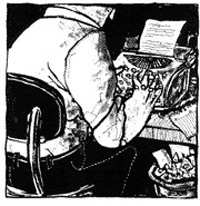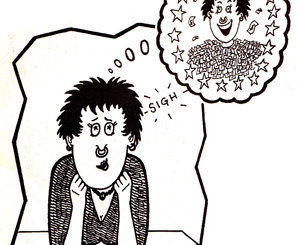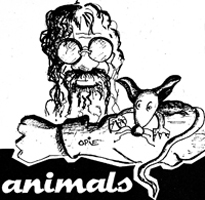 Mike Royko: The Rare Newspaperman
Mike Royko: The Rare Newspaperman
By Dave Liljengren
illustration by Mark Reusch
The only person I know who ever claimed to have met Mike Royko was a Chicago bartender named Chuck. When Chuck was behind the bar at a northside gin joint in the early seventies, he watched Royko get into an argument. The newspaperman had been well-served. He was talking loud and not pausing for discussion. The woman to whom he was directing his vitriol clearly did not agree with him. Royko’s frustration increased. The woman stood her argumentative ground.
According to Chuck, Royko, by then frustrated with his flagging powers of persuasion, poured his drink over the woman’s head. Chuck was shocked by the waste of good whiskey. Further, according to Chuck, the woman got herself an attorney who dug his claws into Royko for a settlement that not only included a fair amount of cash, but also a public apology written into Royko’s column.
I don’t know if this actually happened, as Chuck was quite a storyteller, but it doesn’t matter. It may as well have. The world that Mike Royko wrote about in his daily newspaper columns for the big three Chicago newspapers was one in which newspapermen were allowed to imbibe heavily, hit on spirited women, and spill a few drinks in the process.
When I heard that Royko had passed away I felt a little sorry for him. Had he just hung on a little longer, I thought, he would be back in vogue. In a world so desperate for low-life cool that tuxedoed Bobby Vinton imitators are dubbed “lounge” and mistaken for the next big thing, it can’t be long before Royko’s “workin’ stiff writer” shtick is outed as the Ur-gonzo that it was and forced into prominence.
For those who don’t know, or who’ve never been to Chicago, Mike Royko was the midwesterner’s Jimmy Breslin, a two-fisted muckraker who could write himself and his blue collar cronies into every maelstrom he chose to cover. He came from a working class Chicago neighborhood in the days when such things still existed. To his credit, despite the accretion of celebrity, he never lost touch with the speech patterns or world views of those who shared his relatively humble origin.
I read once that he decided to become a writer while in Korea fighting the police action. Someone in his unit had grown bored with a book and offered it up for grabs, asking if anyone else wanted to read a book about the slums of Chicago. Homesick for the Windy City, Royko took the book and devoured it, discovering that the Chicago “slum” the other soldier had become bored with was actually the neighborhood Royko had grown up in.
The book was Nelson Algren’s The Man With the Golden Arm, and Private Royko was so taken with it that he vowed to return to that slum and start writing. To the very end, he remained true to that foxhole vow.
In a town nicknamed “the Windy City” because of the blowhard politicos who called it home, it’s hard to pinpoint where Royko’s political stance may have been. He was a little left of center perhaps, but was more concerned with fairness than dogma. He had great fun at the expense of Chicago’s ruling Democratic machine, but nothing in his street level prose would lead anyone to conclude he was espousing a stodgy Republican agenda.
He was at his best when he wrote for the now-defunct Chicago Daily News. The last of Chicago’s afternoon papers, the Daily News remained pro-labor and retained some of the muckraking agenda that Chicago journalists like Lincoln Steffens and Upton Sinclair brought to the world at the turn of the century, even as the Daily News was being trounced by corporate cheerleaders, the Chicago Tribune.
In Royko’s last column for the Daily News, as it was printing it’s last issue twenty years ago, he blamed the paper’s decline on the fact that they reported the truth about the Democratic Party’s political convention of 1968.
At that convention, thousands of hippies demonstrated for peace in Chicago’s front yard, Grant Park. When night fell, the mayor of Chicago, Richard J. Daley, sent in police to clear the park. Under a doomsday shroud of tear gas, helmeted Chicago cops, armed with billy clubs, broke heads first and asked questions later in an orgy of violence described for the aghast nation by Walter Cronkite, who observed the park, like a pope on the balcony, from the window of his room in the Michigan Avenue Hilton Hotel.
The following day, when asked in a press conference to explain the extreme actions taken by his police, Mayor Daley uttered the now-famous lines, “Gentlemen, get your facts straight for a change. The policeman isn’t there to create disorder, the policeman is there to preserve disorder…”
The national press criticized Daley’s “gestapo” tactics. The Chicago press, with the exception of the Daily News, sanitized the story and relieved the popular Mayor from having to answer for the actions of his law enforcers.
Chicagoans, by the tens of thousands, dropped their subscriptions to the Daily News. By the mid-seventies, Mayor Daley was elected to his final term by a record margin and the Daily News was forced to close its doors. In that farewell column Royko explained that for a good number of Chicagoans, their idea of good sport was to watch police breaking heads in Grant Park and they weren’t willing to tolerate a paper which disagreed with this.
It was also at the Daily News that Royko wrote a particularly moving Christmas column. It was the first of his columns that I ever came into contact with. I was young enough that it was read to me. It dealt with a fictional, homeless, Puerto Rican couple named José and Maria who came to Chicago with their son, Jesus, and how they were given the runaround by governmental agencies ostensibly set up to help people like them. At my family’s Christmas table, the Royko column was read along with the birth account in the Gospel of Luke.
Most of the books by Royko out there are just rehashings of old columns, but he did write one great work of non-fiction. His exposé of Chicago’s Democratic machine,Boss: Richard J. Daley and Chicago is a blunt, powerful, yet plainly factual telling of just how the jowly neanderthal named in the title managed to control the second largest city in America for more than two decades.
The odd thing about the Chicago Democratic machine is that, although corruption was rampant and well-known, no one seems to have been bothered by it. Richard J. Daley’s eldest son, Richard M. Daley, is the current mayor of Chicago, and another Daley son, William, is in Clinton’s cabinet. As it would be in an ancient tribal kingdom, political power in Chicago is absolute, incorruptible, infinite in length, and passed from father to son like eye color.
Perhaps Royko realized this in his later years and stopped caring. It became fashionable in the 1980s to dislike Royko. His columns seemed to dwell on banal gripes about modern life, and his regular guy pose grew tiresome as the blue collar traditionalists he once ably championed began to vanish from the Chicago landscape.
Between the 1970 and the 1990 census, the population of Chicago shrank from 3.4 million souls to to 2.8 million. In those twenty years, more people left Chicago than currenty live in Milwaukee or Seattle. No longer was Chicago the brawny, blue collar, “City of Big Shoulders.” Instead it was a city of great diversity that took more pride in its position as a center of the commodities trade than it did in its rusting steel mills and abandoned stockyards.
I must admit that I was one of those who belittled Royko in his dotage. As I collected my thoughts for this piece, however, I was forced to put the man into the context of his city and I began to see him again as a gift. In a cold and impersonal city run by corrupt politicians, he was the rare newspaperman who could cause families all over town to pause, before stuffing themselves at Christmas, to ponder the fates of José, Maria, their son Jesus, and all the others who couldn’t find room at the great inn of mid-century Chicago. He will be missed.
Peace to his memory.



